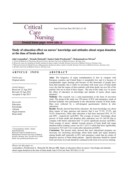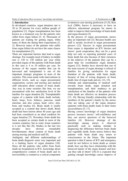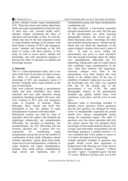بخشی از مقاله
Aims: The frequency of organ transplantation in Iran in compare with European countries and United States is remarkably low and it is because of transplantable organ shortage and because of this thousands of people have been died annually, this is while we encounter with some cases of brain death every day that the organs of these patients with brain death can save life of the patients who are in need of these organs. The aim of this study was “to assess the effect of education on knowledge and attitude of nurses about organ donation”.
Methods: This research was a semi-experimental in the form of test-retest study. The group of the study was 120 nurses of ICU and emergency wards of Kerman hospitals who participated in the educational seminar of brain death. Data were collected by a self-designed questionnaire (before & after education).
Results: Results showed that before education the least knowledge was about three organs of lung, pancreas and marrow that it was 73.3%, 57.5%, and 54.2% respectively, while after education it had been increased 95%, 91.7% and 80% , respectively (p<0.001). The average of nurses’ knowledge about process of brain death and donation after education was 9.4 (±0.78) that in compare with before education had 7.5 (±2.6) significant increase (p<0.001). Total average of nurses’ attitude towards process of brain death and organ donation before training course was 65.7 (±13.7) which had been significantly increased to 76.9 (±8.7) two weeks after education (p<0.001).
Conclusion: The present study showed that more educational programs are necessary for increasing knowledge about brain death and organ donation among health staff especially in ICU and emergency wards that are starter of diagnosis process of brain death patients. Special education should be started from university level and should be continued in the form of in-service training.
Please cite this paper as:
Azmandian J, Poorhoseini S, Shokouhi M, Mirzaei MR. Study of education effect on nurses’ knowledge and attitudes about organ donation at the time of brain death. Iran J Crit Care Nurs 2013;6(1):11-20
Study of education effect on nurses’ knowledge and attitudes S. Poorhoseini et al. 12
1. Introduction
In developed countries, organ donation rate is 20 to 30 percent for every million people of population [1]. Organ transplantation has been known as a treatment way for the patients who suffer from organ failure [2- 4]. Thousands of patients are waiting for getting organ, while many of them die during their expectations [5, 2]. However many of the patients who suffer from organ failure do not have the same chance for transplantation [3].
There are important barriers that lead to organ shortage. For example need of kidney in middle east is 120 to 130 million per year while provided organs of the patients with brain death in this area is 4 to 10 million per year. So increase of the organs number that can be harvested and transplanted is one of the important strategic programs in most of the societies. This issue needs wide interventions in different levels, such as; organ procurement organization, society and nursing and medical staff education about content of brain death. Any way in some societies like Iran, we are encountered with low satisfaction level of the families for organ donation [6]. Transplantable organs of a patient with brain death include; heart, lungs, liver, kidneys, pancreas, small intestine, and also cornea, heart valve, skin, bone and trachea [4]. Brain death is totally accepted as a content that shows death. Brain death had been known about 40 years ago and had been considered as an ideal condition for organ donation [7]. Nowadays brain death has been accepted as certain death in most of the western countries, but in some Asian countries it is not like this [8]. Studies in the last two decades have showed remarkable bewilderments about content of brain death among nursing and medical staff [9].
Ambiguity and different understandings of brain death diagnosis seem very important and is a limiting factor of organ donation [10]. Since all the patients who suffer from brain death are hospitalized in ICU, knowledge about comprehensive content of brain death and its irreversibility is counted as a critical component
in intensive care nursing profession [11,9]. Kim et.al (2006), knows it necessary to have an effective educational program for nurses in order to improve their knowledge of brain death and organ donation [3].
In the process of organ procurement, nurses play an important role [3]. Because health care staff is mostly involved in organ procurement process [12]. Success in organ procurement from corpse is dependent on ICU doctors and nurses’ good cooperation, they can be a great help not only in reporting potential cases of brain death but also because of their closeness to the relatives of the patients they can be a great help for coordination organ donation request [13]. Studies have showed that one of the main reasons of organ shortage is refusal of families for giving satisfaction for organ donation of the patients with brain death, because of fear of wrong diagnosis of brain death, fear of organ trade and etc. [14, 15].
Attitude and understanding of medical staff towards brain death, organ donation and transplantation, and their tendency to get satisfaction of the families of the patients with brain death are effective on donation process [13, 16]. Having friendly relationship with the members of the patient’s family by the nurses who are taking care of the organ donators (patients with brain death) leads to their faster successfulness [5, 17].
Having correct knowledge of organ donation process increases nurses’ self-confidence and they can answer questions of the bereaved families [4]. However shortage of the knowledge among nurses is observed practically such as making mistake in diagnosing the difference between brain death and vegetable death. Some nurses believe that patients with brain death may return to consciousness in the future. The important question is that if nurses of ICU and emergency ward do not believe in brain death as certain death, how can they have relationship with the bereaved family of the organ donator and how can they talk to them? [18] It is expected that gaining enough knowledge causes improve of
Iran J Crit Care Nurs 2013;6(1):11-20
13 S. Poorhoseini et al. Study of education effect on nurses’ knowledge and attitudes
positive attitude towards organ transplantation [19]. There have been some studies about brain death and organ transplantation in Iran but most of them have only assessed health staff’s attitudes without considering the effect of education and knowledge on that. So with this default that may be the most important reason of organ donation shortage of the patients with brain death is because of ICU and emergency nurses’ attitudes and knowledge as the first point of contact with these patients, in this study we tried to assess nurses’ attitude and knowledge, and with educational program to measure the effect of education on attitude and knowledge increase.






